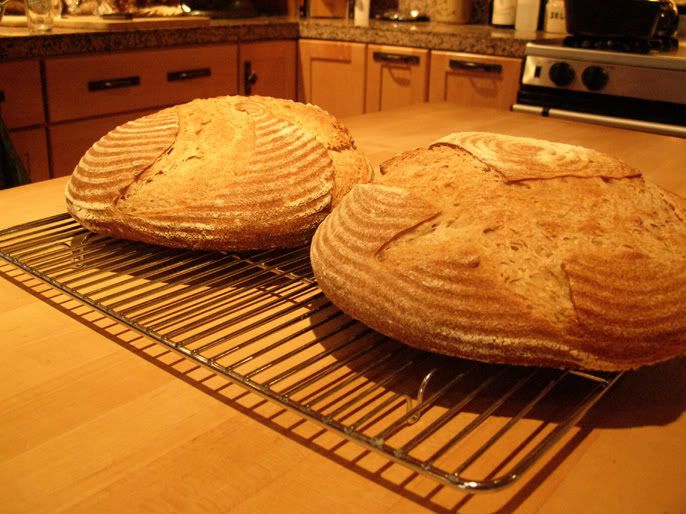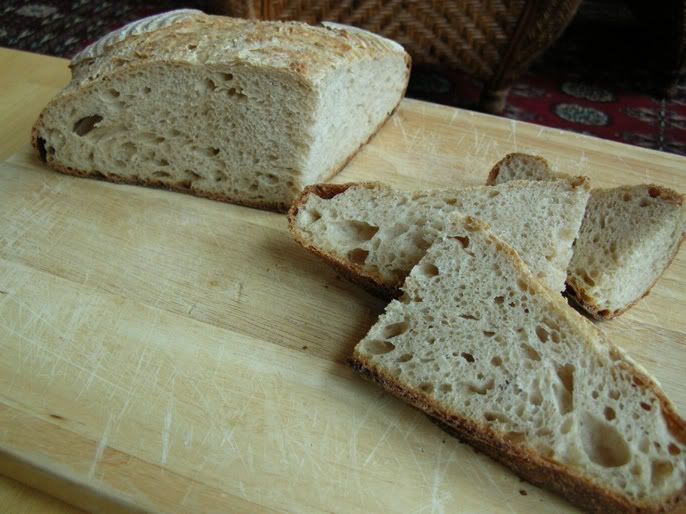For about the past 2-3 weeks, it seems that my Thom Leonard boules, which I have made every week since about November, are suddenly coming out overproofed even though I have not changed my technique: as soon as the loaves are slashed on the peel and hit the hot oven stone, they collapse and spread out at the slashes.
I was wondering if it was because my 100% hydration starter is getting very acidic as it is maturing, despite being well fed at either 1:4:4 or 1:2:2 by weight. Do I need to adjust proofing times and temps accordingly with a strong starter? Is it gobbling up the gluten too fast? Seems if I feed my starter more than 1:4:4 it does not get active enough, though, so I don't want to over-dilute it either. Are the population of lbs overpowering the polulation of yeasts?
 To try to adjust, in yesterdays batch, I used a slightly stiffer dough, and lowered the first fermenting time from 4-5 hours down to 3-3.5, before the dough doubled, then proofed for only 2.5 hours down from 3.5-4. I also fermented and proofed at about 75F rather than 85F.
To try to adjust, in yesterdays batch, I used a slightly stiffer dough, and lowered the first fermenting time from 4-5 hours down to 3-3.5, before the dough doubled, then proofed for only 2.5 hours down from 3.5-4. I also fermented and proofed at about 75F rather than 85F.
I got better results but still not as good as I had in the very beginning of my sourgdough baking: the loaves still rose nicely and held their shape a little better in the bannetons but still spread out very wide at slashes when I slashed and baked, but at least this time they got decent oven spring and rose to a better dome than my last 2-3 tries. Notice how much the dough spread out at the slashes - the interior had little structure and was getting gooey and batter-like just before putting in the oven.
I got some holes in the crumb but nothing spectacular, more dense in the center than I like for this recipe:

The only other variable I can think of between the past 2-3 weeks and before, other than the acidity of my starter, is that I am now using King Arthur organic artisan flour rather than the King Arthur regualr AP flour. Perhaps the organic artisan is using a softer wheat and therefore has less gluten? They have about the same protein and ash contents according to the KA website, though.
Any ideas on what is going on? Suggestions?
Since you've made them every week for months and they just changed now, I'd have to go with the flour, since that sounds like the only factor that's different.
I wonder if the organic flour is a little more variable? Not to suggest it's a problem, but I was just wondering if the pool of contributers to the flour is smaller, if any changes due to weather or whatever might make a bigger difference....if say 5 farmers were contributing to the mill rather than 50. I really don't know how it all works but it just came to mind.
Anyway I know a change of flour can cause some adjustments, it might just be you need to tweak a little, like you aleady are.
And thanks for your tip about the columbia crumb--It's true I hadn't made boules before--wierd to think shape could change that much but that may be it!
Mountaindog,
I make a whole wheat miche something like the BBA miche recipe but much closer to the "mixed flour miche" in Bread by Hamelman. I have started to experiment w/"sifted organic whole wheat flours" and the like, and I found that a lot more folding than I used to do when I used ordinary KA WW and Bread Flour in a 50/50 mix. Also, hydration levels needed to get the same dough consistency do seem to vary with different flours.
I wonder if there are any dough conditioners that are missing in the organic flour that are in the AP flour. For examle, is there diastatic malt needed in the organic flour or could it be there is some kind of gluten conditioner, like ascorbic acid, for example. I'm not sure what all KA may include in their mass market products that maybe aren't there in the organic products. I bet you could email their customer care and get a good explanation. They have been great about responding in detail when I've had a question.
As far as the culture, maybe you could reduce how long you allow the culture to ripen before you put it in the refrigerator and use it sooner before it has ripened in the refrigerator as much, in order to bring it to a less sour level.
Have you changed the flour in the culture or the preferment (if there is one, I'm not sure which recipe you're using - where is the Thom Leonard Boule found?). That might significantly change how fast either of those ripen.
Good luck figuring it out. Would love to hear what solved it.
Bill
I use different organic flours from different mills repeatedly, whatever supply meets my demand of the moment is what I use. Perhaps the KA flour is coming from many mills in different locales around the country rather than a specific one for this brand you are using. I'm sure KA has to contend with this when they are sourcing from all the mills they buy from. Protein levels can be difficult to measure on a level plane every time so maybe an odd mix was achieved? As bwraith suggested above I would contact KA if needed.
How many starters are you using now? I find I have better results with my whole wheat if I use a whole wheat starter rather than my unbleached starter.
It may be a combinatioon of the two items: need to fold more, and maybe the organic flour is different enough from the regular AP to warrant different treatment. I'll contact KA and ask about the dough conditioners in the regular AP. Breadnerd and Pumpkinpapa - I'm sure you're right that KA has to source it's flour from whomever is available at the time with the limited stock of organic wheat - that makes sense.
Now that I think of it, I recall Rena in Delaware had a similar issue with oranic flour from a local mill that was too soft and not giving her good structure (not that all organic flour is like that - but the influence of fewer mills in the mix may be a factor). I may have to do a little test by picking up a bag of regualr KA AP and compare it side by side with the organic using the exact same recipe, starter, and conditions.
Pumkinpapa - I keep 2 starters now, both at 100% hydration: a 100% organic rye, and a 25%/75% organic whole wheat/organic white mix. I have used both to make the leonard boule the past 3 weeks with pretty much the exact same result. I recently spiked my wheat/white starter with rye flour and more whole wheat to strengthen it. Both starters are very active.
Mountaindog,
I was curious if you'd also changed your cultures to the new AP flour, or are you staying with the exact same flour as before, if you get a chance to respond. I'm interested to get more knowledge of what happens to a culture in flavor terms as you vary things like protein levels, time allowed for the culture to ripen and so on.
Also, would be interested why the culture is getting more sour. My experience has been that my culture hasn't changed much in how sour it is over time, although I can make it more sour just by waiting for it to ripen more before using. However, I've used the same brand of KA Bread Flour in my starter for the last two years, and I pretty much have followed the exact same procedure with it all that time, i.e. let it rise by double and refrigerate, which always takes 5 hours at about 70F after it's fully revived, i.e. after 2-3 feedings without letting it go dormant.
One last point is that I've had good luck getting an idea of the flour performance from the type of wheat that the label or web site says is used, if specified. The wheat should be hard spring or winter wheat, as far as I can tell, with the spring wheat being the highest gluten and most able to work with sourdough fermentation. Also, sometimes the mill web sites will suggest applications, and if it doesn't say hearth breads, that can mean the protein levels are on the lower end or maybe not as tolerant of sourdough fermentation.
Bill